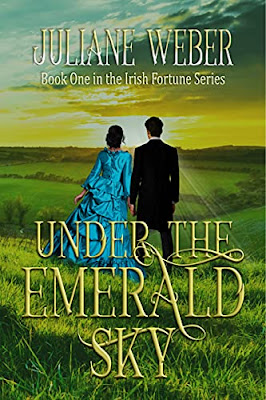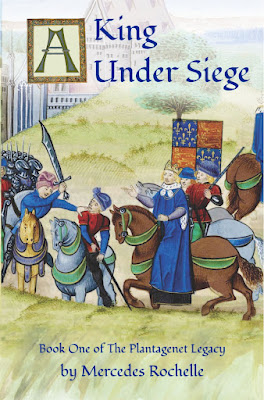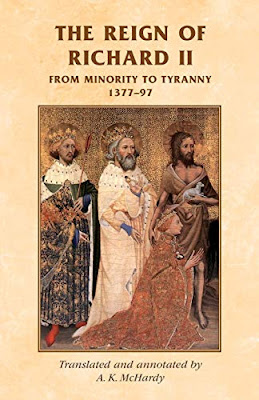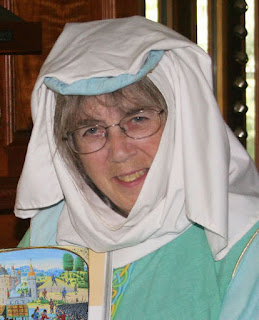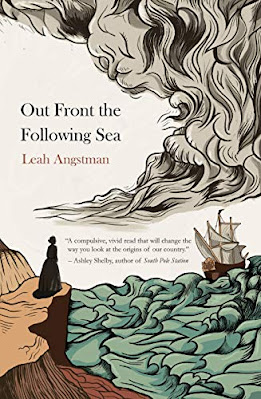31 January 2022
Special Guest Interview with Justin Newland, Author of The Coronation
30 January 2022
Special Guest Interview with L. K. Wilde, Author of Queenie of Norwich
I'm pleased to welcome author L. K. Wilde to The Writing Desk:
Tell us about your latest book.
Queenie of Norwich is based on the true story of Queenie Read, my great grandmother. Queenie was born Ellen Hardy in 1900 and spent the first few years of her life living in the Norwich yards. At six years old her mother sold her to the traveling fair. All Queenie was told was to wait on the corner of the street for a lady named Julia. She didn’t know who Julia was, where she was going, or why she had to meet her.
Queenie stayed with the travelling fair until she was fourteen, when the death of her ‘adopted’ father and the outbreak of WW1 forced her back to the city of her birth. She returned to care for the mother who had abandoned her, scraping by on her earnings from work at a munitions factory.
In 1924 Queenie met Barny Read, a man involved in the illegal world of off-course betting. She became Barny’s ‘bookies runner’, riding round the city on her bicycle, collecting debts. Queenie gained her name when a local newspaper reported- ‘Police Raid on Betting Shop, Queen Bee Escapes’! Queenie and Barny married, but her longed for children never came, and she was diagnosed with a heart-shaped womb. Queenie’s dreams of motherhood were fulfilled when, after the death of her sister, she adopted her niece Barbara.
What is your preferred writing routine?
I fit my writing around various other jobs, so it’s usually a case of wherever, whenever I can. I set myself the goal of writing 500 words a day, sometimes it turns out to be a lot more, sometimes it’s all I can do to squeeze out 500 pesky words. But it keeps me going and ensures whatever book I’m writing keeps its momentum. I have a desk set up for writing, but more often than not sit on my bed, propped up with pillows, my laptop on my knees!
What advice do you have for new writers?
Practice makes perfect, whether that’s writing, editing, or marketing. Take time to learn the many skills you’ll need to get a book into the world, and don’t be afraid to ask others for help. There’s a supportive writing community out there ready and willing to encourage, listen and offer advice- make use of it!
What have you found to be the best way to raise awareness of your books?
I’ve found social media to be a really useful tool. I recently had a journalist contact me through Instagram which has resulted in a double page spread about my book in a local paper. Having said that, word of mouth is also an excellent way of letting people know your books. I’m hopeless at telling people about my books, but thankfully I have very supportive friends and family who do that for me! I’m also trying to learn the ropes of Amazon ads; I’ve not yet mastered it but hopefully I’m getting there.
Tell us something unexpected you discovered during your research.
My greatest discovery was tracing the couple who had bought Queenie and adopted her into fairground life. It took days of cross-checking newspaper articles and fairground names with the ancestry website, but eventually I found records of a Julia and Henry Westrop who owned a shooting gallery. On one census they registered a daughter, Nellie Westrop, and further investigation confirmed she was the girl I was looking for. It was such an exciting discovery I actually screamed with joy!
What was the hardest scene you remember writing?
This is a tricky question as there were so many! I was writing as Queenie, in the first person, so the whole thing was a very emotional experience. The scene that stands out though was when Queenie finally gets a home with a proper bathroom. I never thought I’d weep over a bath, and I know that sounds strange, but if you read the book, it should all make sense!
What are you planning to write next?
I’m currently working on a book about a famous 19th century Cornish murder. It’s written from the perspective of both the victim and murderer’s wives, as I felt women are often overlooked in the reporting of such events. It begins with the murder, and follows the wives as they navigate through the trial, execution and their lives as widows. Cheery stuff!
L. K. Wilde
# # #
About the Author
Author and musician LK (Laura) Wilde was born in Norwich, but spent her teenage years living on a Northumbrian island. She left the island to study Music, and after a few years of wandering settled in Cornwall with her husband, where she raises her two crazy, delightful boys. Dreams of writing started early for Laura, and she carried a note book round at school, scribbling stories whenever she could. During her teens Music took center stage (excuse the pun) and she applied her love of writing to song lyrics. In her 20's, a full time teaching career meant any dreams of becoming an author were put on hold. In 2018 she embarked on an ambitious Music project with Cornish folk band The Rowan Tree, unearthing and retelling forgotten stories of Cornish miners in India. The project involved a substantial amount of writing as well as music, and her dream of writing a book was rekindled. Eventually, with a great deal of encouragement from family near and far, she began writing her first novel. Silver Darlings was released on Amazon in early 2021. Laura's second novel Queenie of Norwich was released in February 2022. Find out more at Laura's website http://www.lkwilde.com/ and find her on Twitter @lkwilde28 January 2022
Historical Fiction Spotlight: Under the Emerald Sky: A tale of love and betrayal in 19th century Ireland, by Juliane Weber
It’s 1843 and the former British Army officer Quinton Williams has come to Ireland to oversee the running of his father’s ailing estate and escape his painful past. There he meets the Irishwoman Alannah O’Neill, whose family is one of few to have retained ownership of their land, the rest having been supplanted by the English over the course of the country's bloody history.
But as the love story develops between Quin and Alannah, disaster looms – the Great Famine that would forever change the course of Ireland’s history. With repeated failure of the potato harvest upon which most Irish families depend, thousands will go hungry, with sickness and starvation sweeping through Irish farms, decimating poor populations for years to come.
27 January 2022
Special Guest Post by Mercedes Rochelle, Author of A King Under Siege (The Plantagenet Legacy, Book 1)
Available from Amazon UK and Amazon US
Researching The Fourteenth Century
When I finished my SAXON EARLS series, I felt that I had thoroughly investigated the period—at least, as much as I could without reading Latin. My decision to jump forward three hundred years was a daunting one.
I essentially had to start over, for I only knew the basics of the period and much of my knowledge was gleaned from Shakespeare, my inspiration. Alas, Shakespeare was a dramatist, not a historian—no matter how much credence we give him! His play, RICHARD II was fabulous, but as it turns out it only covered the last three years of Richard's life. None of it had anything to do with my current novel.
By then, at least, I had a system. It took me a year of daily reading before I even began writing about Richard II. I've learned that the fat books (in page-length) are the best starting points. They give us a broad brush-stroke (like a landscape painting) and create the structure for the story. The huge books tend to be sparse on details.
This was certainly the case with Richard II. Nigel Saul wrote a big biography about him, but it was only a starting point. I discovered books by Charles Oman and Dan Jones about the Peasants' Revolt, which was pretty well documented. Then I stumbled across the "Manchester Medieval Sources Series"; this series gives us direct translations of chroniclers covering key events in several periods.
This one, annotated by A.K. McHardy, was entitled THE REIGN OF RICHARD II: FROM MINORITY TO TYRANNY 1377-97 (and it carried me into my next volume). Invaluable. It documented every single crisis in Richard's reign from the proverbial horse's mouth. Needless to say, this book is well-thumbed and I was very fortunate indeed to have access to it. This kind of reference material is very rare.
The chroniclers tended to disagree depending on their agendas. Thomas Walsingham, who composed the St. Alban's Chronicle and was a key source, was pro-Lancastrian and very definitely anti-Richardian. The Westminster Chronicle was pro-Richard, as he was a big donor. Some chroniclers wrote down their observations second or third-hand, while others may have been eye-witnesses; it's up to later historians to sort that out. As a result, I had to delve into academic articles to compare notes. I learned to pay close attention to footnotes; this is where I found most of my articles. These essays are specific to a particular subject, so the author puts every bit of knowledge into an event (including all contradictory source material).
If I'm lucky, I often find these articles online. JSTOR.org is a fabulous source; I pay $10 per month for a subscription and it's well worth it. Sometimes I have to pay for the article. Otherwise, they might be bound in a compilation such as Fourteenth Century Studies or The Fifteenth Century (in fifteen volumes) and can't be had elsewhere. These can get very expensive, and alas, sometimes each volume only has one or two articles I need. If I'm desperate enough, I'll bite the proverbial bullet and hope they will provide more help in future projects!
So over the course of a novel, I usually consume well over 30 history books and fill two loose-leaf binders full of articles. After I've run my course, I go back to the beginning and re-read much of the material to pick up stuff I missed the first time through. You just can't absorb it all when it's new. The reading never stops while I'm writing; occasionally I'll be able to insert something in my editing phase.
Each century has its definitive scholars. In late 14th-early 15th century England you absolutely must read Kenneth McFarlane; he opened up new scholarship on the period in the 40s and 50s. My favorite historian is Chris Given-Wilson, who did write a "fat" book about Henry IV. He also gives great background on the royal household and English nobility. Without the background, the history will fall flat.
Needless to say, if I'm not enamored with a subject, I'm not likely to write a novel about it. I would say I'm spending an average of two years thinking about and writing each book; with a series, I'm already researching one or even two books ahead. It helps foreshadow certain events. When I get to the end of a series, it's like falling off a cliff!
Mercedes Rochelle
# # #
About the Author
Mercedes Rochelle is an ardent lover of medieval history, and has channeled this interest into fiction writing. Her first four books cover eleventh-century Britain and events surrounding the Norman Conquest of England. The next series is called The Plantagenet Legacy about the struggles and abdication of Richard II, leading to the troubled reigns of the Lancastrian Kings. She also writes a blog: HistoricalBritainBlog.com to explore the history behind the story. Born in St. Louis, MO, she received by BA in Literature at the Univ. of Missouri St.Louis in 1979 then moved to New York in 1982 while in her mid-20s to “see the world”. The search hasn’t ended! Today she lives in Sergeantsville, NJ with her husband in a log home they had built themselves. Find out more from https://www.mercedesrochelle.com/ and find Mercedes on Facebook and Twitter @authorrochelle23 January 2022
Special Guest Interview with Rob Samborn, Author of The Prisoner of Paradise
Available from Amazon UK and Amazon US
Nick and Julia O'Connor's dream trip to Venice collapses when a haunting voice reaches out to Nick from Tintoretto's Paradise,
the world's largest oil painting.
Tell us about your latest book
The Prisoner of Paradise is the first of a series published by TouchPoint Press, and was released on Nov. 30, 2021. It's a thriller blended with historical fiction and magical realism, set in Venice, Italy in the present and 16th century. When an American couple travel to Venice, the husband comes to believe that his true soul mate is not his wife but a woman whose soul has been confined to the world's largest oil painting. On a quest to free his beloved from another time, he discovers an ancient religious order that uses the painting as an ethereal purgatory. He'll do anything to save her, but liberating her means freeing thousands of other souls - and the order will never let that happen.
Honestly, whenever I can. Though I find myself most productive in the morning with a good mug of coffee and at night with a good glass of wine.
What advice do you have for aspiring writers?
Learn, learn, learn, edit, edit, edit. Never stop learning your craft and don't stop revising until your manuscript is so good, people can't help but say, "Wow."
What have you found to be the best way to raise awareness of your books?
This is my debut so I'm still learning. I'm active on social media and growing my presence, which is helpful, but in terms of awareness, I'd say nothing beats paid advertising. It's the only way to reach people outside of your own community. You can also scale reach with budget.
Tell us something unexpected you discovered during your research
As an American writing about present-day and 16th century Venice, I completed thousands of hours of research for this book (plus a research trip to Venice). Whenever I needed to research something to suit the plot, invariably, I'd discover that a person, place or event already existed.
What was the hardest scene you remember writing?
The opening. In my opinion, the most important part of a book is hooking the reader. I'm the first to admit that my second and third acts are considerably better than the first act. But if I can't hook the reader and get them to keep reading, they'll never experience the thrilling adventure that's in store for them. How to grab the reader, introduce character, and provide exposition without it all seeming heavy-handed is very difficult. My original opening was completely different and I wrote five or six distinct versions of the opening chapters.
What are you planning to write next?
The Prisoner of Paradise is the first of a trilogy and the second book, The Painter of Paradise is slated for release in the fall of 2022. That book is already finished, so I'm currently working on the third book. In all likelihood, I'll continue the series to four or five books and I'll write some spinoffs.
Rob Samborn
In addition to being a novelist, Rob Samborn is a screenwriter, entrepreneur and avid traveler. He’s been to forty countries, lived in five of them and studied nine languages. As a restless spirit who can’t remember the last time he was bored, Rob is on a quest to explore the intricacies of our world and try his hand at a multitude of crafts; he’s also an accomplished artist and musician, as well as a budding furniture maker. A native New Yorker who lived in Los Angeles for twenty years, he now makes his home in Denver with his wife, daughter and dog.Find out more at Rob's website https://robsamborn.com/ and find him on Twitter @RobSamborn
22 January 2022
Special Guest Post by by Alan Bardos, Author of The Dardanelles Conspiracy (Johnny Swift Thrillers Book 2)
In January 1915 Captain ‘Blinker’ Hall, Director of British Naval Intelligence, launched an operation to bribe members of the Ottoman Government into making peace. It was hoped that would open the Dardanelles Strait to the Allies. Allowing them to supply Russia and bypass the stalemate on the Western front. It was however superseded by the Allies attempt to open the Straits by force. The ensuing naval and land campaigns resulted in a second stalemate in the East.
My novel ‘The Dardanelles Conspiracy’ charts these missed opportunities through the eyes of Johnny Swift, a disgraced soldier and diplomat. Swift finds himself in the middle of the attempts to open the Straits, by both negotiation and force.
It was the attempt at a negotiated peace that attracted me to the story and caused the greatest amount of difficulty in researching the novel. This was because it’s a fairly obscure footnote to what is largely considered to be a disastrous ‘side show’ to the Western Front.
It was in the footnotes of ‘Gallipoli’ by James Robert Rhodes that I got the first big break in my research. He made reference to two articles in the Royal United Service Institution Journal, from 1963. The first was called ‘A Ghost from Gallipoli’ by Captain G.R.G. Allen. The second was a response to this article written by Admiral Sir William James. My other break was that a friend of mine could actually get hold of the articles for me.
These articles gave a detailed overview of the negotiations and why they failed, but did not give a great deal of colour about the ins and outs of the discussions. I was able to find further details in books about naval intelligence in the First World War, most notably in two biographies of Hall written by Admiral James and David Ramsay.
However, they did not contain any further information about the negotiations themselves, which appear to have been conducted rather vicariously. ‘Blinker’ Hall sent two emissaries to bribe Talat Pasha, the Ottoman Minister of the Interior. The delegation was unable to gain entry to Turkey and had to use the Grand Rabbi of Constantinople as an intermediary, corresponding via messengers.
I had hoped to read this correspondence and gain a greater insight into the negotiations by studying the old Admiralty files. I spent a day or so at the National Archive in Kew, searching the old Foreign Office FO37 card index, which was where the Admiralty files had been archived.
I found a number of references on the index cards, but when I searched the actual files they related to, the documents had been removed. When I queried this I was told that files are often subject to ‘weeding’, where documents not thought to be of value are removed.
Unable to gather any firsthand material I invented the scenes where the Grand Rabbi and Talat Pasha negotiate, dropping my lead character into the mix. While doing this I located another firsthand source in the memoir of Henry Morgenthau. Morgenthau was the American Ambassador in Constantinople in 1915 and had negotiated with Talat Pasha.
Ultimately the negotiations failed, because of promises made to Russia about the future of Constantinople (Istanbul). This was where my trip to the National Archive came into its own. I was able to find some interesting cabinet papers around the future of Constantinople and War Council minutes, about the decision to open the Dardanelles Strait by force. This is when Johnny Swift’s troubles really begin.
Writing historical fiction combines the first great love of Alan Bardos’s life, making up stories, with the second, researching historical events and characters. He currently lives in Oxfordshire with his wife… the other great love of his life. There is still a great deal of mystery and debate surrounding many of the events of the First World War, which he explores in his historical fiction series. Through the eyes of Johnny Swift, a disgraced and degenerate diplomat and soldier. The series starts with the pivotal event of the twentieth century. The Assassination of Archduke Franz Ferdinand. The second book The Dardanelles Conspiracy is based on an attempt by Naval Intelligence to bribe Turkey out of the First World War. In the third book Johnny will be employed as a useful idiot to flush out a traitor working to undermine the Allies.. Follow Alan on Twitter @bardosAlan
21 January 2022
Excerpt from 'A Phoenix Rising: The House of the Red Duke', by Vivienne Brereton
Excerpt:
Thomas Howard, the Earl of Surrey, a veteran soldier and Treasurer of England, is talking to his best friend, Gilbert Talbot, in Calais harbour. The date is September 30th, 1511 and they’re discussing the headstrong young King Henry VIII’s determination to go to war with France.
20 January 2022
Historical Fiction Spotlight: Raid of the Wolves (Ormstunga Saga Book 2) by Donovan Cook
Ulf and his shield brothers are sent on a raid against an old enemy — Francia, a mighty king-dom to the south, now ravaged by civil war. During the perilous sea voyage, Ulf can only fo-cus on one thing. He demands closure: to find the man who slaughtered his family — Griml.
A hidden enemy stalks Ulf and his warriors through Francia, striking mercilessly when they least expect it. Soon the hunters become the hunted. The Norse warriors must make the ultimate choice between defying the king or angering the gods. Both could end in fury.
But there is another threat lurking in the shadows. One that Ulf could never anticipate.
About the Author
19 January 2022
Author Interview With Griffin Brady,, Author of The Heart of a Hussar (The Winged Warrior Series, Book 1)
A Hussar’s Promise is Book 2 and the sequel to The Heart of a Hussar. The Heart of a Hussar ends on a bit of a cliffhanger, and Book 2 picks up where Book 1 leaves off, taking each character on a wild ride. While the story does wrap up at the end, it leaves room for more books in the series.
What is your preferred writing routine?
I still work professionally in the non-writing world, though I’m winding that down. I like to get obligations in that world cleared out of the way before I begin writing so they don’t pull me out when I’m in the “writing zone.” To help me get into that zone, I pull up a Spotify playlist that’s filled with lots of instrumental jazz, new age music, and movie soundtracks.
I’d love to say I can sit for a solid few hours and write without interruption, but I actually find my creative brain works better if I get up and do mundane chores throughout my writing time. For some reason, thoughts about the writing I’ve just completed and new ideas shake loose more easily while I’m emptying the dishwasher or folding laundry. Often, though, I find myself sprinting right back to the computer to capture those thoughts before I lose them completely! I keep a lot of notepads and pens lying around as well.
What advice do you have for aspiring writers?
Write, write, write, even if the story isn’t coming or if you think you’re writing junk. I’ve often found a nugget in a page of garbage that sparked something altogether different and usable. Another piece of advice is to quiet your critical voices. I find this to be one of my greatest challenges. While you may have read tons of books and taken a boatload of classes on craft, try not to focus on the rules as you’re getting the words out and instead let yourself get carried away in your story.
What have you found to be the best way to raise awareness of your books?
Tours and promotions such as this one. Saying “yes” anytime someone asks me to talk or participate in some historical event that relates to the Polish winged hussars.
Tell us something unexpected you discovered during your research.
I discovered that Poland’s constitution was one the U.S. founding fathers studied closely, and they integrated ideas gleaned from their investigation as they formulated the U.S. Constitution.
What was the hardest scene you remember writing?
The lead female character, Oliwia, swears an oath under duress and is later called upon to honor that oath. Those scenes and her anguish were difficult ones to write.
What are you planning to write next?
I’d like to complete Book 3 in the series, which begins in 1620 (5 years after the end of the second book) and will bring back many of the characters from the first two books. The backdrop is the ongoing conflict between Poland and the Ottoman Empire. The Battle of Cecora (1620) will play an important role in that story.
Griffin Brady
# # #
About the Author
Griffin Brady is a historical fiction author with a keen interest in the Polish Winged Hussars of the 16th and 17th centuries. She is a member of the Historical Novel Society and Rocky Moun-tain Fiction Writers. The Heart of a Hussar took third place in the Rocky Mountain Fiction Writers’ 2018 Colorado Gold Contest and was a finalist in the Northern Colorado Writers’ 2017 Top of the Mountain Award. The proud mother three grown sons, she lives in Colorado with her husband. She is also an award-winning, Amazon bestselling romance author who writes under the pen name G.K. Brady. Find out more at https://www.griffin-brady.com and find her on Facebook and Twitter @griffbrady158818 January 2022
Historical Fiction Spotlight: A Woman of Noble Wit, by Rosemary Griggs
17 January 2022
Special Guest Post by Susanne Dunlap: Mining Your Family History for a Great Story
Mining Your Family History for a Great Story? Here Are Three Things to Know.
Writers come to historical fiction in many different ways. Some have been readers of it throughout their lives. Some are academic historians who want the freedom of invention to bring history to life for a wider audience. Others simply find themselves curious about events of the past and enjoy the research and the story craft.
Another avenue that often leads to writing historical fiction is stumbling on some fact about an ancestor, or discovering a trove of family history that leads you into a world you didn’t know existed—and that you’re connected with in some way. This can be very exciting, very inspiring. Maybe there’s a pirate in your past, or a war hero.
In fact, family history can be a rich source of ideas for historical fiction. But if you really want to turn that history into a novel rather than simply recording it in a narrative to share with family members, you’ll have to do all the necessary hard work to craft a great story that strangers would find just as fascinating as you do.
Still thinking about it? Here are a few things to bear in mind as you go:
1. You need a real story.
No matter where your inspiration comes from, it still has to end up as a compelling, satisfying story. That means first of all you have to have a point—a reason—why the story needs to be written. It also means you have to be willing to dig for the hard times, the unpleasant truths, the unsavory characters in your past. You’ll need an antagonist as well as a protagonist, and you’ll have to put your protagonist through hell, no matter how much you like her. Perhaps hardest of all, you’ll have to spend time figuring out exactly where your story begins and ends.
2. You can’t get too hamstrung by what really happened.
It’s possible that the history itself is plenty juicy to provide ample material for a novel. But it’s also very unlikely that the events as they happened will arrange themselves in a satisfying story arc. Good stories are about change, about a protagonist’s journey from one state to another via hardship and tests. Sometimes it’s necessary at the very least to rearrange events, compress time, or even invent characters, actions, or underlying causes in order to make your plot work. And that’s okay. It’s fiction, first and foremost, wherever you found your inspiration.
3. You have to be willing to do the work.
This may seem obvious, but writing a good novel based on your family history takes much more than decent writing skills and a solid idea. It takes an understanding of what drives a narrative, how to get what’s in your head onto the page, and the willingness to change things you’ve sweated over for hours/days/weeks. It takes the same level of planning and prewriting, digging deep and researching, that any historical novel takes.
But the process itself can be immensely rewarding. So many people put writing and publishing a book on their bucket lists, and for good reason. There’s nothing like holding that printed volume in your hand and thinking, I did this.
In my business as an Author Accelerator Certified Book Coach, I use effective tools to help writers wrangle their ideas into shape, keep them motivated through the dark days, act as editor and cheerleader, and guide them to achieving the best manuscript they’re capable of. In the end, they have a book they can be proud of, whether they seek a traditional publishing contract, a hybrid publishing contract, or decide to self-publish—no matter where their initial inspiration came from.
Want to explore that story in your family’s past? I’d love to hear about it! To book a discovery call and find out more about working with me, please fill out this questionnaire. That way I’ll have a good idea of where you are in your project. It’s never too early—or to late—to start working with a book coach!
15 January 2022
Historical Fiction Spotlight: Lady, in Waiting (The Tudor Court Book 3) by Karen Heenan
Available from Amazon UK and Amazon US
Treated like a child by everyone from her husband to the queen, lost in the unfamiliar world of the Elizabethan court, Margaery will have to learn quickly or lose any chance at the life she wants.
Can a marriage for all the wrong reasons make it to happily ever after?
11 January 2022
Book Launch Spotlight: Out Front the Following Sea, by Leah Angstman
New on Amazon UK and Amazon US
Out Front the Following Sea is a historical epic of one woman’s survival in a time when the wilderness is still wild, heresy is publicly punishable, and being independent is worse than scorned—it is a death sentence.# # #
About the Author
Leah Angstman is a historian and transplanted Michigander living in Boulder. Her writing has been a finalist for the Saluda River Prize, Cowles Book Prize, Able Muse Book Award, Bevel Summers Fiction Prize, and Chaucer Book Award, and has appeared in Publishers Weekly, L.A. Review of Books, Nashville Review, Slice, and elsewhere. She serves as editor-in-chief for Alternating Current and The Coil magazine and copyeditor for Underscore News, which has included editing partnerships with ProPublica. She is an appointed vice chair of a Colorado historical commission and liaison to a Colorado historic preservation committee. Find out more at Leah's website https://www.leahangstman.com and find her on Facebook and Twitter @leahangstman6 January 2022
Special Guest Interview with Siobhan Daiko, Author of The Girl from Portofino
I'm pleased to welcome author Siobhan Daiko to The Writing Desk:
Tell us about your latest book.
My latest book is The Girl from Portofino, the second standalone novel in my Girls from the Italian Resistance series.
In 1970, Gina Bianchi returns to the beautiful Italian resort of Portofino to attend her father’s funeral, accompanied by her troubled twenty-four-year-old daughter, Hope. There, Gina is beset by vivid memories of World War 2, a time when she fought with the partisans and her identical twin sister, Adele, worked for the Germans. In her childhood bedroom, Gina reads Adele’s diary, left behind during the war. As Gina learns the shocking truth about her sister, she’s compelled to face the harsh realities of her own past.
What is your preferred writing routine?
When I’m in the process of writing a book, I try to write every day to keep the momentum going. I prefer to write in the mornings as my ageing mind focuses better. If I need to go out on a writing morning, I’ll write in the afternoon instead—but I’m never as productive.
What advice do you have for aspiring writers?
I would say not to consider yourself an ‘aspiring writer’. Writers write. There’s nothing ‘aspiring’ about it. First and foremost, write because it fulfils you, makes you happy. It doesn’t matter if no one else reads what you’ve written. You write because it’s as vital to you as breathing. Becoming an author is different. It’s a craft and you should study it. Take courses, read online advice. Practise, get feedback, keep pushing yourself to improve. Develop a thick skin about criticism and learn from it. A negative review can mean you didn’t write the book the reviewer wanted to read, or that there is room for improvement. There are very few perfect books published, but readers aren’t looking for a perfect book—what they want is a good story and interesting characters. Last, but not least, go for it!
What have you found to be the best way to raise awareness of your books?
I have invested in Facebook ads and they have worked well. I also have a growing readers list for my newsletter. And, of course, The Coffee Pot Book Club has raised awareness of my books via their fab blog tours.
Tell us something unexpected you discovered during your research.
I needed a well-known place in which to set the story and hit upon the stunning resort of Portofino. I had no idea before researching what happened there during the war and gave a resounding ‘yes’ when I discovered that it had been occupied by the German Navy as a headquarters for their coastal defences, the SS incarcerated and tortured political prisoners in a tower on the isthmus, the inhabitants of the village were forced to relocate when concrete sea defences were built, and the quaysides were mined for fear of aquatic landings.
Portofino, known today as a mecca for wealthy tourists, became a target for Allied bombing after the Nazis built anti-aircraft and anti-naval batteries on the headland and the portofinesi lived in fear for their lives.
What was the hardest scene you remember writing?
I can’t answer this question in detail without giving a spoiler. I’ll just say that one of my main characters dies in tragic circumstances. After I’d written the scene, I needed a glass of wine and a hug from my husband.
What are you planning to write next?
I’m planning the next in the series, either The Girl from Verona or The Girl from Bologna. It depends on what I discover in my upcoming research.
Siobhan Daiko
# # #
About the Author
Siobhan Daiko is a British historical fiction author. A lover of all things Italian, she lives in the Veneto region of northern Italy with her husband, a Havanese dog and two rescued cats. After a life of romance and adventure in Hong Kong, Australia and the UK, Siobhan now spends her time, when she isn't writing, enjoying her life near Venice. Find out more at Siobhan's website https://siobhandaiko.org/ an dfollow her on Facebook and Twitter @siobhandaiko




